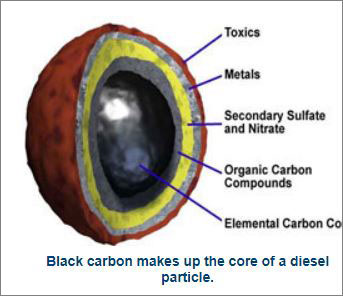Stopping Diesel Pollution
Your neighborhood association (Creston Kenilworth) has joined a citywide coalition of neighborhoods to address Portland’s longstanding and worsening diesel pollution problem.
On September 26, we co-hosted a citywide Townhall Forum on Diesel Pollution, inviting subject matter experts to help us understand the scope of the crisis, and a panel of elected officials and candidates to ask what can be done.
On September 26, we co-hosted a citywide Townhall Forum on Diesel Pollution, inviting subject matter experts to help us understand the scope of the crisis, and a panel of elected officials and candidates to ask what can be done.
What is a diesel particulate?
Also known as “black soot,” a diesel particulate is a product of diesel combustion. When diesel fuel is burned, the exhaust contains tiny particles of carbon surrounded by layers of toxic chemicals and gases. Here is a diagram of one diesel particulate. It is 2.5 microns in diameter or smaller. A micron = 1 millionth of a meter. A human blood cell is 6 microns in diameter. A human hair = the diameter of about 28 particulates. Several thousand particulates would fit on a period. For more information about the effects of diesel engine exhaust on our health, visit: http://www.catf.us/methane/black_carbon/diesel/problems/.
Also known as “black soot,” a diesel particulate is a product of diesel combustion. When diesel fuel is burned, the exhaust contains tiny particles of carbon surrounded by layers of toxic chemicals and gases. Here is a diagram of one diesel particulate. It is 2.5 microns in diameter or smaller. A micron = 1 millionth of a meter. A human blood cell is 6 microns in diameter. A human hair = the diameter of about 28 particulates. Several thousand particulates would fit on a period. For more information about the effects of diesel engine exhaust on our health, visit: http://www.catf.us/methane/black_carbon/diesel/problems/.
Image source: Clean Air Task Force
These tiny particulates evade our body’s defenses, pass through our lungs into our bloodstream, and lodge in our organs, including the brain.
Brooklyn, Creston Kenilworth and other adjacent neighborhoods are severely affected because of the Brooklyn Rail Yard. Locomotives idle 24/7, and the majority of intermodal freight trucks serving the yards lack any modern emissions controls.
These tiny particulates evade our body’s defenses, pass through our lungs into our bloodstream, and lodge in our organs, including the brain.
Brooklyn, Creston Kenilworth and other adjacent neighborhoods are severely affected because of the Brooklyn Rail Yard. Locomotives idle 24/7, and the majority of intermodal freight trucks serving the yards lack any modern emissions controls.


